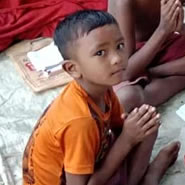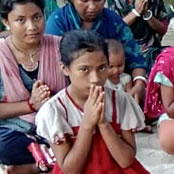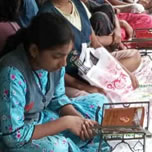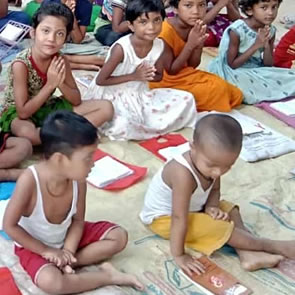Srila Prabhupada Book Distribution: Lotus Ministry Appeals in Rural Bangladesh
- Jeffrey Dunan
- Oct 9, 2025
- 18 min read
Updated: Nov 18, 2025
Key Takeaways
Srila Prabhupada established book distribution as the foundation of spiritual outreach, calling his transcendental literature "the basis" of the Krishna consciousness movement.
Lotus Ministry Trust is actively bringing spiritual wisdom to remote Bengali villages through translated works that connect with local culture and traditions.
Rural Bangladesh presents unique distribution challenges including infrastructure limitations and literacy barriers, yet reading circles are transforming entire communities.
Bengali editions of classics like Bhagavad-gita As It Is and Science of Self-Realization are creating lasting spiritual impact in previously unreached villages.
The current funding shortfall threatens this vital spiritual mission, with even small donations capable of putting life-changing wisdom into the hands of seeking villagers.
When a villager in remote Sylhet Division receives their first copy of Bhagavad-gita As It Is in Bengali, something profound happens that transcends mere book ownership.
Lotus Ministry Is Transforming Lives And Communities
The distribution of Srila Prabhupada's transcendental literature represents one of the most powerful spiritual revolutions of our time, transforming lives and communities across the globe. In Bangladesh, this sacred mission has taken a uniquely focused form through the dedicated efforts of Lotus Ministry Trust, an organization bringing Krishna consciousness to some of the most remote villages in the Bengali-speaking world. Their work continues the legacy of A.C. Bhaktivedanta Swami Prabhupada, who emphasized book distribution as the cornerstone of spiritual awakening in our modern age.
Through Lotus Ministry's specialized rural outreach programs, thousands of villagers are discovering timeless Vedic wisdom in their native language, creating ripples of spiritual transformation across Bangladesh's countryside.
The impact of this work cannot be overstated. As Srila Prabhupada himself declared, "If you want to please me, distribute books!" This divine instruction continues to inspire devotees worldwide, with Bangladesh's rural communities now experiencing the life-changing power of these transcendental texts. Where previously spiritual knowledge might have been inaccessible, now the highest philosophical treasures of Vedic tradition arrive in remote villages, often carried by foot across challenging terrain by dedicated distributors.
Srila Prabhupada Book Distribution: Bringing Krishna's Wisdom to Bangladesh's Villages
The verdant landscapes of rural Bangladesh, with bamboo groves swaying in monsoon winds and golden rice fields stretching to the horizon, now nurture not just agricultural bounty but spiritual harvest. In these villages, where life maintains a rhythm largely unchanged for centuries, Srila Prabhupada's books arrive like beacons of transcendental light. Local distributors, often traveling by bicycle or on foot across challenging terrain, bring these spiritual treasures to communities where few other religious texts ever reach.
What makes this distribution effort especially powerful is its cultural resonance.
Bangladesh, with its deep Bengali heritage, shares the same language and cultural roots as Srila Prabhupada himself, who was born in Calcutta (now Kolkata). When villagers encounter these profound spiritual teachings in their native Bengali tongue, the connection is immediate and profound. Many rural Bangladeshis maintain traditional values and spiritual inclinations that create fertile ground for Krishna consciousness, unlike the more secularized urban populations.
"In these remote villages, one book can transform an entire family, and one family can transform an entire community. We've witnessed spiritual revolutions begin with just a single copy of Bhagavad-gita arriving in a village." — Lotus Ministry field coordinator
The distribution methodology adapts to local realities. Where literacy rates may be lower, illustrated editions and simplified translations serve as entry points. Where financial resources are limited, subsidized and sponsored book programs ensure accessibility. The approach is never commercial but always compassionate – meeting villagers where they are while inviting them toward higher spiritual understanding.
Srila Prabhupada's Book Distribution Mission
The foundation of today's rural Bangladesh outreach was laid decades ago by Srila Prabhupada himself, who revolutionized spiritual literature distribution globally. Despite starting with just $7 and a few books in 1965, Srila Prabhupada created what would become one of the world's most extensive spiritual literature distribution networks. His vision transcended conventional publishing – he saw each book as a spiritual ambassador that could work eternally, awakening dormant Krishna consciousness in readers for generations to come.
"Books are the basis," Prabhupada frequently declared, establishing literary distribution as the primary method of spreading Krishna consciousness. This philosophy stemmed from his own spiritual master, Bhaktisiddhanta Sarasvati Thakura, who compared book distribution to playing on a great mrdanga (drum) whose sound could be heard around the world. Unlike temples with fixed locations, books could travel anywhere, reaching people who might never visit a spiritual center.
What began with Prabhupada personally carrying books in his suitcase eventually blossomed into millions of spiritual books distributed annually in dozens of languages. The Bengali-language editions now reaching Bangladesh's villages represent a spiritual homecoming of sorts – bringing these teachings back to the cultural region where many Vaishnava traditions originated. Bangladesh, with its deep connection to Bengali culture and language, forms a natural extension of Prabhupada's original vision.
The spiritual potency of this literature stems from its authenticity. Unlike modernized or watered-down presentations, Prabhupada's books present the Vedic knowledge without compromise, yet in an accessible way that speaks to contemporary readers. Each book serves as a direct connection to the parampara (disciplic succession), carrying the full spiritual potency of the ancient teachings.
Why Srila Prabhupada Called Books "The Basis" of Spiritual Revolution

Lotus Ministry Trust Founder Vasanta Das And The Bhagavad Gita
When Srila Prabhupada proclaimed "Books are the basis," he established a revolutionary paradigm for spreading spiritual knowledge. Unlike ephemeral speeches or transient interactions, books create lasting transformation through repeated study and reference. They become spiritual companions in the home, consulted during moments of reflection and shared among family members. In Bangladesh's village settings, where extended families often live together, a single book may influence dozens of individuals across multiple generations. For more insights into Srila Prabhupada's book distribution, visit this resource.
Prabhupada understood the philosophical depth required for genuine spiritual awakening. His books don't merely offer superficial inspiration but provide comprehensive explanations of Vedic knowledge, complete with Sanskrit verses, precise translations, and detailed purports. This thorough approach builds an unshakable foundation for spiritual practice – something especially important in remote areas where regular access to teachers might be limited.
The permanence of books also resonated with Prabhupada's long-term vision. "These books will be the law books for human society for the next ten thousand years," he boldly declared. In rural Bangladesh, where traditions endure across centuries, this perspective aligns perfectly with local cultural values that honor preservation of knowledge. When a villager receives a spiritual book, they often treat it as a treasured family heirloom to be protected and passed down.
The History of Srila Prabhupada's Book Distribution in Bangladesh
Book distribution in Bangladesh began in earnest during the early 1980s, shortly after the country's independence. Early pioneers faced immense challenges – political instability, economic hardship, and limited infrastructure created formidable barriers. Despite these obstacles, dedicated devotees transported books across river deltas and through monsoon-flooded villages, often spending weeks away from home to reach remote communities.
The 1990s marked a turning point when local printing operations were established, dramatically reducing costs and increasing accessibility. Where previously books had to be imported from India at considerable expense, local Bengali editions could now be produced at prices more affordable to the average Bangladeshi. This localization of production aligned perfectly with Srila Prabhupada's instruction that "books should be printed locally wherever possible."
By the early 2000s, distribution networks had expanded to cover most major cities, but rural outreach remained limited. This gap inspired the formation of Lotus Ministry Trust in 2021, specifically dedicated to bringing Srila Prabhupada's books to the countryside where approximately 65% of Bangladesh's population resides. Their innovative approaches – including boat-based distribution during flood seasons and coordination with village market days – have since become models for rural outreach worldwide.
How Translated Works Reach Bengali-Speaking Communities
The translation process represents a sacred responsibility to preserve Srila Prabhupada's original meaning while making the texts accessible to local readers. Each Bengali edition undergoes rigorous review by panels of language experts and spiritual authorities. Special attention is given to maintaining the philosophical precision of Sanskrit terms while using natural, flowing Bengali that resonates with village readers.
Cultural sensitivity guides every aspect of the distribution approach. Books are presented not as foreign imports but as revelations of wisdom already embedded in Bengali spiritual traditions. Distributors receive specialized training in explaining connections between Prabhupada's teachings and local religious customs, creating bridges of understanding rather than confrontation. This contextual introduction has proven especially effective in areas where unfamiliar spiritual concepts might otherwise meet resistance.
Lotus Ministry Trust: Specialized Rural Outreach
Lotus Ministry Trust emerged from a profound realization – while urban centers in Bangladesh had growing access to spiritual literature, rural villages remained virtually untouched by Srila Prabhupada's books. This "spiritual desert" in the countryside represented millions of souls without access to transcendental knowledge. Founded by Bangladeshi devotees with intimate knowledge of rural realities, the Trust developed targeted approaches that address the unique challenges of village distribution.
Unlike conventional book distribution focused on high-volume sales, Lotus Ministry emphasizes relationship-building and community integration. Distributors often spend extended periods in a single village area, developing connections with local leaders, participating in community gatherings, and establishing trust before introducing spiritual literature. This patient approach creates sustainable interest rather than fleeting curiosity.
The Trust's organizational structure combines centralized planning with localized execution. Regional coordinators from each district develop distribution strategies tailored to their specific geographical and cultural contexts. These strategies account for everything from local dialects to seasonal agricultural cycles that determine when villagers will have both time and financial resources for spiritual pursuits. This sensitivity to local conditions has proven critical to sustained success.
Current Srila Prabhupada Book Distribution Statistics in Bangladesh
Lotus Ministry's impact can be measured in both breadth and depth of distribution. Current figures show approximately 75,000 books distributed annually across rural Bangladesh, reaching an estimated 3,500 villages. While these numbers might seem modest compared to urban distribution statistics, they represent extraordinary penetration considering the logistical challenges involved. Each book typically reaches multiple readers as village customs encourage sharing of valuable literature. For more insights, you can explore the significance of Srila Prabhupada book distribution.
Geographic distribution data highlights both successes and ongoing challenges. The districts of Sylhet, Chittagong, and Khulna show the strongest reception, possibly due to stronger historical connections to Vaishnava traditions. Conversely, some northwestern border regions remain underserved due to transportation difficulties and cultural factors that require specialized approaches. The Trust continuously refines its strategy based on these regional variations.
Village Reading Circles: Building Knowledge Together
One of the most effective innovations in rural Bangladesh has been the establishment of "Krishna Katha Circles" – village reading groups that gather regularly to study Srila Prabhupada's books collectively. These circles transform what might otherwise be solitary reading into community learning experiences that deepen understanding through discussion and shared insights. Typically meeting weekly in a participant's home or village gathering place, these circles create accountability and momentum that sustain spiritual practice.
The structure of these reading circles cleverly adapts to varying literacy levels found in rural communities. More educated participants read passages aloud, followed by group discussion where even non-readers can contribute perspectives and questions. This inclusive approach ensures that literacy limitations don't become barriers to spiritual knowledge. In some villages, the circles have even motivated adult literacy efforts specifically to enable direct study of Prabhupada's books.
Beyond intellectual understanding, these circles foster practical application of spiritual principles in daily village life. Discussions frequently center on how concepts like karma, devotional service, and spiritual equality can transform family relationships, work ethics, and community harmony. This practical focus makes the philosophy immediately relevant rather than abstractly theoretical, addressing real challenges faced by rural Bangladeshis.
From Single Book to Community Transformation
The journey from initial book distribution to spiritual community often follows a remarkable pattern that demonstrates the transformative power of Prabhupada's literature. It typically begins with a single influential person in the village – perhaps a teacher, elder, or respected farmer – receiving and reading a book. Their positive experience creates curiosity among family and neighbors, generating requests for more literature during the distributor's next visit.
As interest grows, informal gatherings naturally evolve into structured study circles. These then expand to include kirtan (devotional singing), prasadam distribution (sanctified vegetarian food sharing), and eventually regular spiritual programs that incorporate elements of traditional Vaishnava practice. The progression often culminates in the establishment of a small Nama Hatta center – a community-based gathering place dedicated to Krishna conscious activities that serves as a spiritual hub for surrounding villages.
Youth Engagement Through Spiritual Literature
Perhaps the most promising aspect of rural book distribution is its impact on Bangladesh's youth, who represent both the nation's largest demographic and its most receptive audience for spiritual wisdom. Young people between 16-25 years old consistently demonstrate the highest engagement with Prabhupada's books, often reading them multiple times and forming informal study groups among peers. This generational receptivity creates sustainable spiritual communities that will continue growing long after initial distribution efforts.
Educational integration has emerged as a particularly effective approach. Lotus Ministry collaborates with rural schools to incorporate selections from Prabhupada's books into extracurricular reading programs. Competitions for essay writing and philosophical debates based on these texts generate enthusiasm while deepening understanding. Many young readers report that these books provide answers to fundamental questions about purpose and identity that their conventional education leaves unaddressed.

Srila Prabhupada's Books Making The Biggest Impact On The Smallest Readers
5 Key Books Making the Biggest Impact
While the complete collection of Srila Prabhupada's works encompasses dozens of volumes, five specific titles have demonstrated exceptional impact in Bangladesh's rural context. Their effectiveness stems from content that resonates particularly well with village sensibilities and formats that address local reading preferences. Lotus Ministry has strategically prioritized these works in their distribution efforts, creating specialized editions with features tailored to rural readers.
1. Bhagavad-gita As It Is (Bengali Edition)
The cornerstone of Prabhupada's literary contribution, this definitive presentation of Krishna's divine dialogue with Arjuna finds special resonance in Bangladesh where the warrior's moral dilemma echoes the ethical challenges faced by many villagers. The Bengali edition includes additional footnotes explaining cultural references already familiar to Indian readers but potentially unfamiliar to Bangladeshis with different historical exposure. Particularly impactful is Chapter 18 on renunciation, which speaks directly to the simple living ethos already valued in rural communities.
Distributors report that the verse-by-verse format with Sanskrit, Bengali translation, and purport makes this volume especially suitable for group study, encouraging multiple readers to participate by taking different roles. Many village reading circles progress through just one verse per meeting, allowing for deep contemplation and discussion of practical applications. The book's substantial nature – both physically and philosophically – gives it status as a family treasure, often displayed prominently in village homes.
2. Easy Journey to Other Planets
This compact volume has proven remarkably effective as an introductory text in areas where scientific curiosity meets spiritual inquiry. Its exploration of space travel through yogic methods rather than mechanical means creates immediate interest, particularly among younger readers fascinated by astronomy and cosmology. The book's brevity makes it accessible to those with limited reading time or experience, while its profound content challenges materialistic worldviews through logical arguments rather than sectarian assertions.
Village readers especially appreciate the book's practical approach to mantra meditation as a means of consciousness elevation. Many report beginning their spiritual journey by experimenting with the chanting methods described, finding tangible results that motivate deeper exploration of Prabhupada's other works. The small format also makes it ideal for carrying during agricultural work or sharing during tea breaks, allowing spiritual study to integrate with daily village routines.
3. Science of Self-Realization
This collection of interviews and essays addresses contemporary questions with timeless wisdom, making it particularly effective for reaching educated villagers with modern concerns. Its dialogue format presents complex philosophy through accessible conversations, using questions that rural readers often ask themselves. The book's wide-ranging topics – from agricultural ethics to family relationships to scientific progress – demonstrate how Krishna consciousness applies to every aspect of human experience, not just formal religious practice.
The chapter addressing traditional religious practice versus spiritual science resonates deeply in Bangladesh, where many villagers seek to reconcile inherited customs with personal spiritual growth. Readers frequently report that this book resolves long-held questions about the purpose of rituals they've performed for generations without fully understanding. The photograph sections also create immediate engagement, as images of Western devotees practicing ancient Vedic traditions challenge preconceptions about spirituality being limited by cultural background.
4. Krishna Book
Prabhupada's summary study of the Tenth Canto of Srimad-Bhagavatam presents Krishna's transcendental pastimes in narrative form that connects naturally with Bangladesh's rich tradition of katha (spiritual storytelling). Village readers, often already familiar with fragments of Krishna's activities through cultural osmosis, discover the complete context and deeper meaning of these divine stories. The book's episodic structure makes it ideal for incremental reading during evening gatherings – a single chapter providing ample material for a night's contemplation.
The Bengali edition includes additional cultural context notes that help readers understand the historical geography of Vrindavan and Mathura, places that hold tremendous spiritual significance but may be unfamiliar as physical locations. Colorful plate illustrations bring the narratives to life, making the content accessible even to children and less literate adults. Many villages report that Krishna Book readings have revived the traditional practice of spiritual storytelling that had been fading with modernization.
5. Beyond Birth and Death
This slender volume addresses life's most profound questions with remarkable clarity and brevity, making it particularly valuable in rural areas where philosophical literacy may be limited. Its direct examination of reincarnation resonates with inherited beliefs while providing logical explanations that satisfy intellectual curiosity. The book's pocket size and focused content make it ideal for initial distribution, often serving as the "first taste" of Prabhupada's wisdom that inspires interest in more extensive works.
The clear explanation of the soul's journey beyond physical existence provides comfort and purpose in communities where death remains a visible part of daily life rather than an institutionally hidden reality. Many readers report that this book transformed their understanding of both birth and death rituals they had performed throughout their lives, revealing deeper spiritual significance beyond mere tradition. Its practical guidance for spiritual progress regardless of external circumstances makes it especially relevant in economically challenged rural contexts.
The Financial Challenge: Why Your Support Matters
Despite its tremendous spiritual impact, the rural book distribution mission faces serious financial challenges that threaten its sustainability. The economics of reaching remote villages create a structural deficit – distribution costs often exceed what local economies can support through book purchases alone. While urban distribution can operate on a self-sustaining model with books sold at prices covering expenses, rural outreach requires significant subsidization to make spiritual literature accessible to villagers with limited financial resources.
The current situation is particularly critical. Rising paper costs have increased production expenses by approximately 35% over the past two years, while pandemic-related economic pressures have reduced villagers' discretionary spending capacity. This widening gap between costs and affordable pricing threatens to reduce distribution volume just as demand for spiritual knowledge is growing. Without increased support, many eager readers may remain without access to these transformative books.
Current Funding Shortfall
Lotus Ministry Trust currently faces a monthly funding gap of approximately 425,000 Taka (≈$3,900 USD) to maintain established distribution levels across rural Bangladesh. This shortfall has already necessitated reducing outreach in some peripheral areas and limiting the variety of titles available in more remote regions. Without addressing this financial challenge, the transformative potential of book distribution cannot be fully realized, particularly in the most underserved communities where spiritual literature is least accessible.
The consequences extend beyond numbers. Each unfunded book represents a missed opportunity for spiritual awakening – a village family continuing without access to transcendental knowledge, a potential study circle never formed, a community transformation delayed. The ripple effects of these missed connections impact not just individual spiritual journeys but the broader revitalization of Bangladesh's rich Vaishnava heritage that these books help preserve and renew.
Current financial models project that stabilizing and expanding rural distribution would require establishing a dedicated endowment of approximately 50 million Taka (≈$460,000 USD) to generate sufficient ongoing income for subsidizing rural distribution indefinitely. While this represents a substantial investment, it would create a permanent foundation for spiritual education throughout Bangladesh's countryside for generations to come – a legacy of incalculable spiritual value.
Cost Breakdown of Rural Distribution
Understanding the economics of rural book distribution reveals why financial support is so essential. Beyond basic printing costs, reaching village communities involves expenses unfamiliar in urban contexts. Transportation represents a significant factor – delivering books to remote areas often requires multiple modes of transit including vehicles specially modified for unpaved roads, boats during monsoon seasons, and sometimes human porters for the final kilometers to isolated settlements. These logistical requirements can add 40-60% to the base cost of each book.
The distribution model also includes crucial follow-up activities that ensure books become catalysts for ongoing spiritual practice. Trained facilitators periodically revisit villages to organize reading discussions, answer questions, and provide supplementary materials that support understanding. While essential for effectiveness, these activities represent additional costs not reflected in the physical book itself but vital to its transformative impact.
Distribution Component | Cost Per Book (Taka) | Percentage of Total |
Printing & Materials | 180 | 40% |
Rural Transportation | 90 | 20% |
Distributor Support | 70 | 15% |
Follow-up Programs | 60 | 13% |
Administrative Overhead | 50 | 11% |
Total Distribution Cost | 450 | 100% |
How Small Donations Multiply Book Impact
The economics of rural distribution create extraordinary leverage for financial supporters. A donation of just $25 USD enables approximately 10 books to reach village readers, potentially transforming not just individual lives but entire family units and community groups. When these books catalyze the formation of reading circles and spiritual gatherings, the impact multiplies exponentially as knowledge spreads through social networks. Many supporters find that sponsoring regular monthly distributions creates ongoing relationships with specific village areas, allowing them to witness gradual transformation over time.
Join the Movement: Ways to Help
The mission to bring Srila Prabhupada's wisdom to rural Bangladesh offers multiple avenues for meaningful participation beyond financial support. This collaborative approach creates opportunities for individuals worldwide to contribute according to their specific capacities and interests. Whether through sponsorship, volunteering, specialized skills, or awareness-building, each contribution advances the same fundamental goal – making transcendental knowledge accessible to those who seek it most sincerely.
Sponsor Book Distribution Packages
Lotus Ministry has developed structured sponsorship options that connect supporters directly with distribution outcomes. The Village Transformation Package ($100/month) funds comprehensive distribution to an entire village area, including initial books, follow-up materials, and support for establishing sustainable study circles. The Educational Outreach Package ($50/month) focuses specifically on providing literature to rural schools and youth programs. For those with more limited resources, the Individual Impact option ($25/month) sponsors regular book distribution to families showing particular spiritual interest and readiness.
Sponsorship creates a personal connection with the distribution mission. Many sponsors develop ongoing relationships with specific village communities, following their spiritual journey over months and years. This connection transcends mere donation, creating meaningful bonds between supporters and recipients despite geographical separation. For more information on the mission's impact, visit the Srila Prabhupada Book Distribution page.
Volunteer Opportunities for International Supporters
For those able to offer time rather than financial resources, Lotus Ministry welcomes international volunteers with specific skills that advance their mission. Remote volunteering options accommodate international supporters unable to travel to Bangladesh.
Digital Support Through Social Media Awareness
In our connected world, raising awareness represents a valuable contribution accessible to anyone with online presence. Following and sharing Lotus Ministry's social media accounts amplifies their reach, bringing distribution stories to potential supporters worldwide. Using hashtags like #PrabhupadaBooks and #SpiritualBangladesh increases visibility while creating digital community around the distribution mission. Personal testimonials about how Prabhupada's books have transformed your own life create powerful endorsements that inspire others to support making these books available to seeking villagers.
Digital fundraising through personal networks offers another powerful support method. Many supporters organize birthday fundraisers, challenge campaigns, or matching gift initiatives that leverage their social connections into tangible distribution resources. These peer-to-peer approaches often reach individuals who might not otherwise encounter the rural distribution mission, creating new support networks that extend far beyond traditional constituencies.
The Future of Spiritual Wisdom in Rural Bangladesh
The vision for Bangladesh's spiritual future extends far beyond current distribution statistics. Lotus Ministry's strategic plan aims to establish self-sustaining spiritual communities in every major rural district within the next decade – creating a network of Krishna conscious villages that preserve and develop Vaishnava culture throughout the countryside. These communities would serve as spiritual lighthouses, radiating transcendental knowledge outward to surrounding areas through their example and active outreach.
Technological integration represents a key component of this future vision. As digital connectivity continues improving in rural areas, complementary electronic resources will extend the impact of physical books through multimedia support materials, online study communities, and virtual mentoring relationships. These digital extensions will not replace printed volumes but enhance their accessibility, particularly for younger generations integrating spiritual wisdom with contemporary life.
The most profound aspect of this future vision lies in its self-propagating nature. As more villagers experience spiritual transformation through Prabhupada's books, many naturally develop the desire to share this knowledge with others. This organic growth creates an expanding network of indigenous distributors who understand local contexts intimately. The long-term sustainability of rural spiritual awakening depends on this transition from externally supported distribution to community-driven sharing of transcendental wisdom – a transition already visible in villages with established reading circles now conducting their own outreach to neighboring communities.
Frequently Asked Questions
Since establishing the rural distribution program, Lotus Ministry has encountered recurring questions from both potential supporters and book recipients. These FAQs address common inquiries about both practical aspects of the distribution process and deeper philosophical questions about its purpose and impact.
Who was Srila Prabhupada and why are his books important?
A.C. Bhaktivedanta Swami Prabhupada (1896-1977) was a spiritual teacher and translator who brought the ancient wisdom of Vedic literature to global audiences. After receiving instruction from his spiritual master to spread Krishna consciousness through the English language, he traveled to America at age 69 with just a few rupees and a trunk of books. Over the next twelve years, he established centers worldwide, translated dozens of classical Sanskrit texts with detailed explanations, and inspired thousands to adopt spiritual practices based on the Vaishnava tradition.
His books are distinctive for their authenticity, clarity, and practical application. Unlike many modern interpretations that dilute traditional teachings, Prabhupada presented the Vedic wisdom without compromise while making it accessible to contemporary readers through relevant examples and clear explanations. Each book combines precise Sanskrit-to-English translations with extensive commentaries that illuminate both philosophical concepts and their practical implementation in daily life. This combination of fidelity to tradition with practical relevance makes his works uniquely valuable for spiritual seekers worldwide.
How does book distribution in rural Bangladesh differ from urban areas?
Rural distribution presents distinct challenges and opportunities that shape the entire approach. Logistically, reaching remote villages requires specialized transportation methods adapted to seasonal conditions – from boats during monsoons to modified motorcycles navigating unpaved paths. Distribution timing must align with agricultural cycles when villagers have both available time and financial resources, typically after harvest periods. These practical considerations necessitate more deliberate planning than urban distribution, which can occur year-round in predictable environments.
Can I donate books instead of money to Lotus Ministry?
While the intention behind book donations is appreciated, financial contributions are significantly more effective for several reasons. Local printing in Bangladesh substantially reduces costs and ensures appropriate language editions (Bengali rather than English). Shipping donated books internationally would cost more than printing locally while creating logistical complications at customs. Additionally, the distribution program requires balanced inventories of specific titles based on carefully assessed community needs rather than random assortments. Your financial support enables the Ministry to maximize impact by producing exactly what rural communities require in the most cost-effective manner.
What percentage of donations goes directly to book printing and distribution?
Lotus Ministry maintains exceptionally low administrative overhead, with 87% of all donations directly humanitarian programs, funding book printing, transportation, and distribution activities. The remaining 13% covers essential administrative functions including financial accountability, impact assessment, and supporter communications. This high efficiency ratio is possible because many administrative functions are performed by volunteers, and the organization maintains minimal physical infrastructure beyond what's absolutely necessary for operations.
When you support Lotus Ministry Trust's book distribution efforts, you participate in a sacred tradition of sharing transcendental knowledge that transforms lives one reader at a time. The ripples of this spiritual awakening extend far beyond individual villages to revitalize an entire culture's spiritual heritage.















Comments